高中英语Unit5MusicSectionⅤWriting—咨询信教案(含解析)新人教版必修2
- 格式:doc
- 大小:58.00 KB
- 文档页数:3
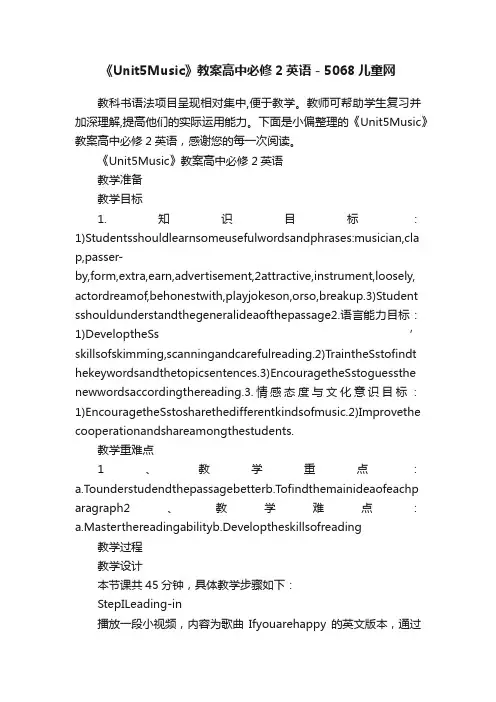
《Unit5Music》教案高中必修2英语 - 5068儿童网教科书语法项目呈现相对集中,便于教学。
教师可帮助学生复习并加深理解,提高他们的实际运用能力。
下面是小偏整理的《Unit5Music》教案高中必修2英语,感谢您的每一次阅读。
《Unit5Music》教案高中必修2英语教学准备教学目标1.知识目标:1)Studentsshouldlearnsomeusefulwordsandphrases:musician,cla p,passer-by,form,extra,earn,advertisement,2attractive,instrument,loosely, actordreamof,behonestwith,playjokeson,orso,breakup.3)Student sshouldunderstandthegeneralideaofthepassage2.语言能力目标:1)DeveloptheSs’skillsofskimming,scanningandcarefulreading.2)TraintheSstofindt hekeywordsandthetopicsentences.3)EncouragetheSstoguessthe newwordsaccordingthereading.3.情感态度与文化意识目标:1)EncouragetheSstosharethedifferentkindsofmusic.2)Improvethe cooperationandshareamongthestudents.教学重难点1、教学重点:a.Tounderstudendthepassagebetterb.Tofindthemainideaofeachp aragraph2、教学难点:a.Masterthereadingabilityb.Developtheskillsofreading教学过程教学设计本节课共45分钟,具体教学步骤如下:StepILeading-in播放一段小视频,内容为歌曲Ifyouarehappy的英文版本,通过介绍演唱乐队twins引出本单元话题。

Unit 5 Music Reading for Writing讲义-高中英语人教版(2019)必修第二册【教材佳句】1.It’s an honor to be here and to share with you the story of how music has had an impact on my life.非常荣幸来到这里与大家分享音乐是如何影响了我的人生的。
讲解:积累句式it’s an honor to do,很荣幸做某事,通常是演讲的开场。
举一反三:像我这样的职业,今天能站在这里与你们对话,是我的荣幸。
_________________________________________________________________________________2.I hope all of you will somehow begin to treasure music and make it a part of your time. Thank you!我希望大家能以某种方式开始珍惜音乐,让音乐成为你生活的一部分。
谢谢大家。
讲解:演讲结束的一种收尾方法,这里是提出希望愿景,最后感谢,有时候也可以放邮件结尾。
举一反三:我希望这能说明职业规划课程对中国高中生的重要性。
如果你想了解更多的信息,请告诉我。
____________________________________________________________________________________________________ ______________________________________________________________【相关语料】音乐类型Pop music流行音乐;Rock music摇滚音乐;Jazz爵士乐;Classical music 古典音乐;Hip hop嘻哈音乐;Electronic music电子音乐;Country music 乡村音乐;Blues蓝调音乐;R&B (Rhythm and Blues)节奏蓝调音乐;Reggae雷鬼音乐;Folk music民谣音乐;Metal music金属音乐;Punk rock朋克摇滚音乐;Gospel music福音音乐;Soul music灵魂音乐;Techno电子舞曲;Civic balled民谣乐器名称Piano钢琴;Guitar吉他;Violin小提琴;Flute长笛;Trumpet小号;Drum set鼓套;Saxophone萨克斯管;Clarinet 单簧管;Cello大提琴;Harp竖琴;Bass guitar贝斯吉他;Trombone长号;French horn法国号;Oboe双簧管;Accordion手风琴;Xylophone木琴;Ukulele尤克里里;Violoncello大提琴;Banjo班卓琴;Mandolin曼陀林琴;Zither 古筝演奏相关Play(v.)弹奏;Instrument乐器;Musician音乐家;Performance演奏;Practice练习;Concert音乐会;Solo独奏;Ensemble合奏;Improvisation即兴创作;Score乐谱;Note音符;Rhythm节奏;Tempo速度;Dynamics动态;Harmony和声;Melody旋律;Chord和弦;Arpeggio琶音;Scale音阶;Technique技巧【典例剖析】本单元的写作任务是写一篇演讲稿。
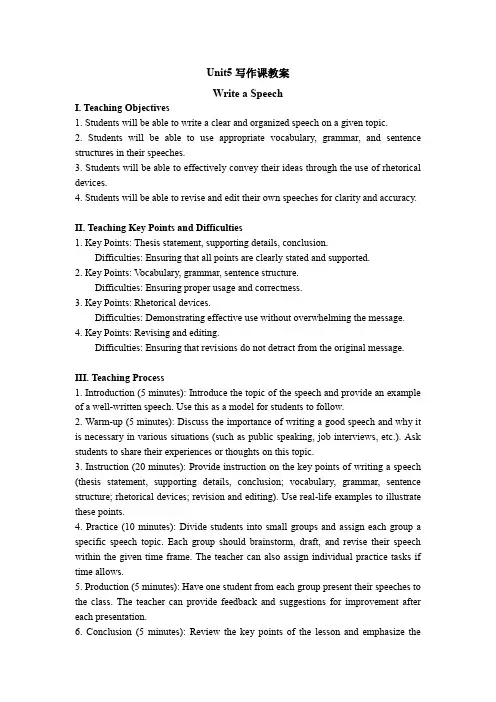
Unit5写作课教案Write a SpeechI. Teaching Objectives1. Students will be able to write a clear and organized speech on a given topic.2. Students will be able to use appropriate vocabulary, grammar, and sentence structures in their speeches.3. Students will be able to effectively convey their ideas through the use of rhetorical devices.4. Students will be able to revise and edit their own speeches for clarity and accuracy.II. Teaching Key Points and Difficulties1. Key Points: Thesis statement, supporting details, conclusion.Difficulties: Ensuring that all points are clearly stated and supported.2. Key Points: V ocabulary, grammar, sentence structure.Difficulties: Ensuring proper usage and correctness.3. Key Points: Rhetorical devices.Difficulties: Demonstrating effective use without overwhelming the message. 4. Key Points: Revising and editing.Difficulties: Ensuring that revisions do not detract from the original message.III. Teaching Process1. Introduction (5 minutes): Introduce the topic of the speech and provide an example of a well-written speech. Use this as a model for students to follow.2. Warm-up (5 minutes): Discuss the importance of writing a good speech and why it is necessary in various situations (such as public speaking, job interviews, etc.). Ask students to share their experiences or thoughts on this topic.3. Instruction (20 minutes): Provide instruction on the key points of writing a speech (thesis statement, supporting details, conclusion; vocabulary, grammar, sentence structure; rhetorical devices; revision and editing). Use real-life examples to illustrate these points.4. Practice (10 minutes): Divide students into small groups and assign each group a specific speech topic. Each group should brainstorm, draft, and revise their speech within the given time frame. The teacher can also assign individual practice tasks if time allows.5. Production (5 minutes): Have one student from each group present their speeches to the class. The teacher can provide feedback and suggestions for improvement after each presentation.6. Conclusion (5 minutes): Review the key points of the lesson and emphasize theimportance of practicing and revising writing skills in order to improve them. Remind students that they can use the resources provided by the school to further enhance their writing abilities.IV. Homework Assignments1. Individual Work: Each student should write a speech on a topic of their choice, using the techniques learned in class. They should also revise and edit their work before submitting it for grading.2. Group Work: After completing individual work, students should analyze their classmates' speeches for coherence, organization, and effectiveness in conveying their message. They should also provide constructive feedback on how their classmates could improve their work.3. Additional Reading: Students should read articles or books on effective public speaking and persuasive writing to further enhance their understanding of these skills. They should take notes on what they learn and apply these principles when writing their own speeches in the future.V. Assessment Methods1. Written Assignments: The teacher will grade individual and group written assignments based on the following criteria: coherence and organization of ideas, use of appropriate vocabulary and grammar, effective use of sentence structures, and effective use of rhetorical devices.2. Oral Performance: The teacher will evaluate student performances during the class presentations based on the same criteria as written assignments, with an added emphasis on delivery style and audience engagement.3. Self-Reflection: Students will be asked to reflect on their learning process throughout the course, including what they have learned, what challenges they faced, and what they would do differently in the future. This reflection will be used as part of the overall evaluation of their performance in the course.。
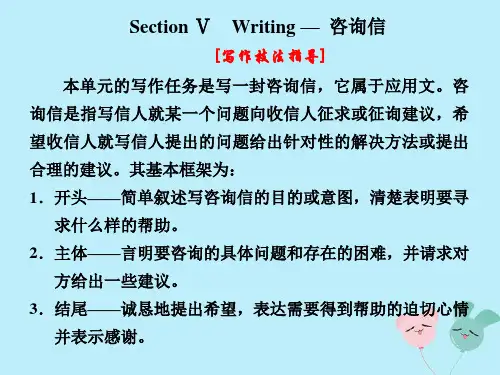
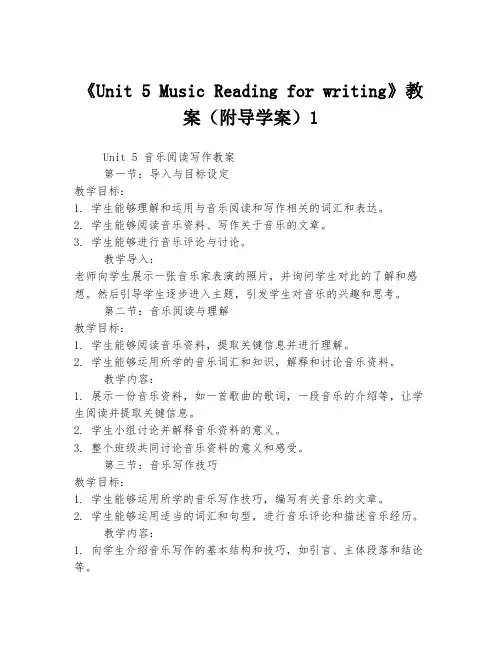
《Unit 5 Music Reading for writing》教案(附导学案)1Unit 5 音乐阅读写作教案第一节:导入与目标设定教学目标:1. 学生能够理解和运用与音乐阅读和写作相关的词汇和表达。
2. 学生能够阅读音乐资料、写作关于音乐的文章。
3. 学生能够进行音乐评论与讨论。
教学导入:老师向学生展示一张音乐家表演的照片,并询问学生对此的了解和感想。
然后引导学生逐步进入主题,引发学生对音乐的兴趣和思考。
第二节:音乐阅读与理解教学目标:1. 学生能够阅读音乐资料,提取关键信息并进行理解。
2. 学生能够运用所学的音乐词汇和知识,解释和讨论音乐资料。
教学内容:1. 展示一份音乐资料,如一首歌曲的歌词,一段音乐的介绍等,让学生阅读并提取关键信息。
2. 学生小组讨论并解释音乐资料的意义。
3. 整个班级共同讨论音乐资料的意义和感受。
第三节:音乐写作技巧教学目标:1. 学生能够运用所学的音乐写作技巧,编写有关音乐的文章。
2. 学生能够运用适当的词汇和句型,进行音乐评论和描述音乐经历。
教学内容:1. 向学生介绍音乐写作的基本结构和技巧,如引言、主体段落和结论等。
2. 展示一篇关于音乐的样例文章,让学生阅读并分析其结构和词汇使用。
3. 让学生选择自己喜欢的音乐,并写一篇有关其感受和评论的文章。
第四节:音乐评论与讨论教学目标:1. 学生能够展示自己的音乐评论和观点,与他人进行讨论和交流。
2. 学生能够倾听和尊重他人的音乐观点,并进行合理的反驳和讨论。
教学内容:1. 学生将自己编写的音乐评论文章进行展示和讨论。
2. 学生就他人的音乐评论进行倾听、提问和反馈。
第五节:综合练习与评价教学目标:1. 学生能够应用所学的音乐阅读和写作技巧,进行综合练习。
2. 学生能够对自己的写作进行自我评价和改正。
教学内容:1. 给学生一些音乐资源,如音乐视频、歌曲、音乐综艺节目等,并让他们选择并进行阅读和写作。
2. 学生将自己的作品进行自我评价,并交流和讨论。

(新课标)高中英语Unit5MusicSectionⅤWriting——求助信讲义新人教版必修2Section ⅤWriting——求助信[文体指导]求助信是向有关组织或个人写信请求帮助,格式大体上同一般书信。
写作时的注意事项如下:1.开门见山,摆出问题直截了当地把你遇到的难题或者困惑告诉对方。
2.态度诚恳,言辞恳切向别人求助,尤其是向长辈或者是自己不熟悉的人求助的时候,态度一定要诚恳,语气要委婉,让对方感到你确实需要并值得帮助。
3.思路清晰,表述明了语言要简练、流畅,层次分明,表述清楚,以便让对方一看就能明白你提出的问题,并能有针对性地给你提出意见和建议。
4.正确把握时态,保证语言准确性写英文求助信的原因就是目前自己在某一方面遇到困难,因此应用一般现在时表达文意,当然描绘自己得到帮助后的进步时应用一般将来时表达文意。
[亮点句式]★自我介绍1.My name is....I'm writing to you for some help.2.I'm writing a letter to you to get some help about...★交代自己所面临的困难1.I have met much difficulty in...2.I find it difficult to...3.I can hardly bear/tolerate/put up with...any longer.★请求对方做某事的表达1.Would you like to...so that...?2.Also,I'd like you to...3.I would appreciate it if...4.I would be grateful if...[写作任务]假如你是李华,你打算与朋友组建一个乐队。
门基乐队的成功给了你很大的鼓舞。
但你和朋友对乐队的名字、主唱、乐器的选择及乐队的类型存在分歧,你决定向门基乐队求助,现在请你写一封词数100左右的求助信。
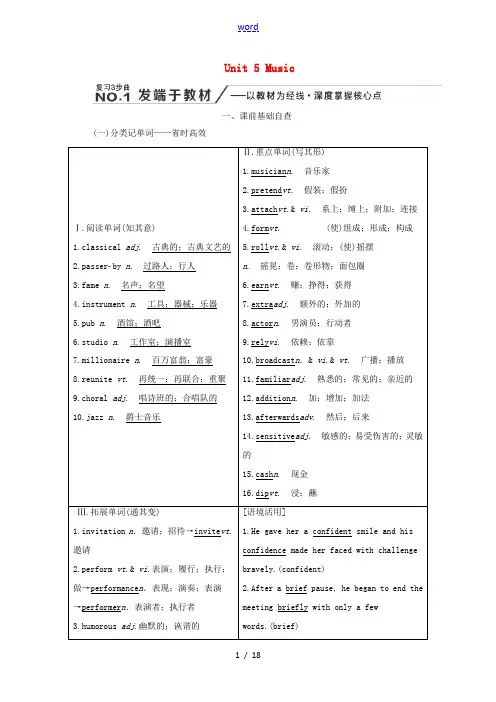
Unit 5 Music一、课前基础自查(一)分类记单词——省时高效Ⅰ.阅读单词(知其意)1.classical adj. 古典的;古典文艺的2.passerby n. 过路人;行人3.fame n. 名声;名望4.instrument n. 工具;器械;乐器5.pub n. 酒馆;酒吧6.studio n. 工作室;演播室lionaire n. 百万富翁;富豪8.reunite vt. 再统一;再联合;重聚9.choral adj. 唱诗班的;合唱队的10.jazz n. 爵士音乐Ⅱ.重点单词(写其形)1.musician n. 音乐家2.pretend vt. 假装;假扮3.attach vt.& vi. 系上;缚上;附加;连接4.form vt. (使)组成;形成;构成5.roll vt.& vi. 滚动;(使)摇摆n. 摇晃;卷;卷形物;面包圈6.earn vt. 赚;挣得;获得7.extra adj. 额外的;外加的8.actor n. 男演员;行动者9.rely vi. 依赖;依靠10.broadcast n.& vi.& vt. 广播;播放11.familiar adj. 熟悉的;常见的;亲近的12.addition n. 加;增加;加法13.afterwards adv. 然后;后来14.sensitive adj. 敏感的;易受伤害的;灵敏的15.cash n. 现金16.dip vt. 浸;蘸Ⅲ.拓展单词(通其变)1.invitation n.邀请;招待→invite vt.邀请2.perform vt.& vi.表演;履行;执行;做→performance n.表现;演奏;表演→performer n.表演者;执行者3.humorous adj.幽默的;诙谐的[语境活用]1.He gave her a confident smile and his confidence made her faced with challenge bravely.(confident)2.After a brief pause, he began to end the meeting briefly with only a fewwords.(brief)(二)练中记短语——记牢用活(三)仿写明句式——以用为本out anywhere without being followed.弗雷迪和他的乐队无论走到哪里都会有人跟随。
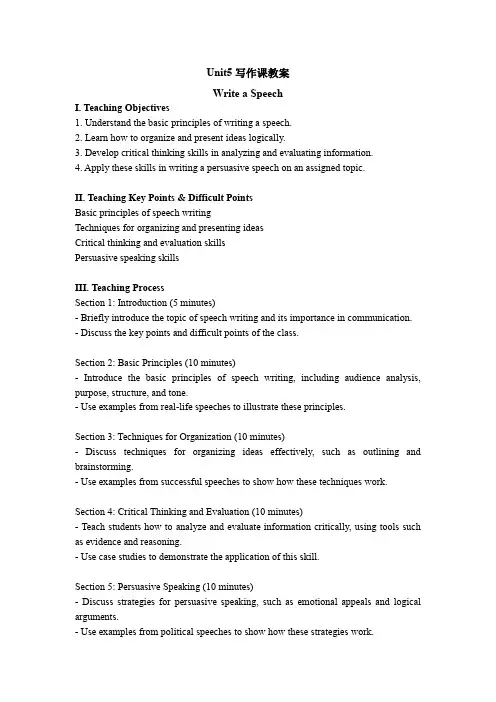
Unit5写作课教案Write a SpeechI. Teaching Objectives1. Understand the basic principles of writing a speech.2. Learn how to organize and present ideas logically.3. Develop critical thinking skills in analyzing and evaluating information.4. Apply these skills in writing a persuasive speech on an assigned topic.II. Teaching Key Points & Difficult PointsBasic principles of speech writingTechniques for organizing and presenting ideasCritical thinking and evaluation skillsPersuasive speaking skillsIII. Teaching ProcessSection 1: Introduction (5 minutes)- Briefly introduce the topic of speech writing and its importance in communication. - Discuss the key points and difficult points of the class.Section 2: Basic Principles (10 minutes)-Introduce the basic principles of speech writing, including audience analysis, purpose, structure, and tone.- Use examples from real-life speeches to illustrate these principles.Section 3: Techniques for Organization (10 minutes)-Discuss techniques for organizing ideas effectively, such as outlining and brainstorming.- Use examples from successful speeches to show how these techniques work.Section 4: Critical Thinking and Evaluation (10 minutes)- Teach students how to analyze and evaluate information critically, using tools such as evidence and reasoning.- Use case studies to demonstrate the application of this skill.Section 5: Persuasive Speaking (10 minutes)-Discuss strategies for persuasive speaking, such as emotional appeals and logical arguments.- Use examples from political speeches to show how these strategies work.Section 6: Practice (10 minutes)- Give students a chance to write a short speech on a given topic, with feedback from the class.- Encourage students to use the techniques and strategies learned in the class.Section 7: Conclusion (5 minutes)- Review the key points and techniques learned in the class.- Encourage students to continue practicing their speech writing skills outside of class.IV. After-Class AssignmentAssign one student each week to deliver a speech on a topic of their choice, with peer feedback and self-evaluation. This will help students apply what they've learned in class and develop their public speaking skills.V. Assessment & ReflectionAssess student progress through regular participation in class discussions, homework assignments, and weekly speech presentations. Reflect on teaching effectiveness at the end of each semester, adjusting teaching methods as necessary based on student feedback and performance data.。


Unit5写作课教案Write a SpeechI. IntroductionThis is a 45-minute high school English writing class focused on the topic of "write a speech". The lesson is designed to help students develop their English writing skills and apply them to real-life situations such as public speaking. The class is based on the fundamentals of Signals and Systems, which are essential knowledge for future graduate studies in related fields.II. Chapter and Time AmountThe class will be divided into four parts, each lasting approximately 10 minutes. This format allows us to cover a variety of topics while keeping the class time manageable.III. Student AnalysisStudents at this level have basic English writing skills but may lack confidence in using the language effectively. They need guidance in organizing their thoughts and expressing them clearly in written form.IV. Teaching Objectives and RequirementsA. Learning Goals:1. Students will learn how to write a clear and effective speech.2. Students will understand the importance of structure and organization in written communication.3. Students will practice using various sentence structures and vocabulary to express their ideas effectively.B. Requirements:1. Students should bring their own laptops or tablets for note-taking during the class.2. Students should actively participate in class discussions and activities.3. Students should complete all homework assignments and submit them by the due date.V. CourseIn addition to academic learning, this class also aims to cultivate students' sense of social responsibility. Through writing speeches, students can express their opinions on important issues and contribute to society in meaningful ways.VI. Teaching Difficulties and Key PointsA. Teaching Difficulties:1. Encouraging students to think critically about their speech topics.2. Providing constructive feedback that helps students improve their writing skills.3. Balancing the amount of content with the time available in each class session.B. Key Points:1. Emphasize the importance of a clear introduction, body, and conclusion in a speech.2. Show students how to use rhetorical devices such as metaphors, analogies, and repetition to enhance their speeches.3. Teach students how to revise their work for clarity, coherence, and accuracy.VII. Teaching Strategies and MethodsA. Teaching Strategies:1. Active learning: Encourage students to ask questions, share their ideas, and engage in group discussions during class time.2. Hands-on learning: Use interactive online tools such as Google Docs or Quizlet to allow students to practice their writing skills in a fun and engaging way.3. Peer teaching: Invite senior students or teachers to give presentations on effective writing strategies, then have them guide their peers through the process of writing a speech.B. Teaching Methods:1. Guided practice: Start with simple prompts and gradually increase the complexity of the speech topics as students become more confident in their writing abilities.2. Modeling: Show students examples of good speeches and explain why they are effective, then have them try to emulate those techniques in their own writing.3. Peer review: After completing a speech, have students exchange their work with a partner or group for feedback and suggestions for improvement.VIII. Learning ActivitiesA. Problem Introduction: Introduce the topic of public speaking and its importance in various fields such as politics, business, and education. Ask students what they know about public speaking and why it matters to them personally or professionally.B. Content Theme: Discuss different types of speeches, such as persuasive, informative, or entertaining, and explain how to choose a suitable topic for each type of speech based on personal interests and audience expectations.C. Teacher Activity: Give an example of a good speech and analyze its structure,language use, and rhetorical devices to demonstrate the principles of effective public speaking. Then provide students with a list of potential speech topics and ask them to choose one that they find interesting and challenging to write about within the given time frame.D. Student Activity: Have students brainstorm ideas for their chosen speech topics, create an outline for their speeches, and start drafting their first paragraphs using the guidelines provided earlier in this section (e.g., clear introduction, body, conclusion). Encourage students to ask questions and seek feedback from their peers or teacher throughout the process of writing their speeches.E. Homework Questions & Answers: Assign homework that requires students to revise their completed speeches based on feedback received from classmates or teacher (e.g., correcting grammar mistakes, improving clarity, strengthening arguments). Also include some open-ended questions about how they used specific language features or rhetorical devices in their speeches for further discussion in class next week!。

Section Ⅴ Writing—咨询信咨询信是指写信人就某一个问题向收信人征求或征询建议,希望收信人就写信人提出的问题给出针对性的解决方法或提出合理的建议。
一、基本框架1.开头——简单叙述写咨询信的目的或意图,清楚表明要寻求什么样的帮助。
2.主体——言明要咨询的具体问题和存在的困难,并请求对方给出一些建议。
3.结尾——诚恳地提出希望,表达需要得到帮助的迫切心情并表示感谢。
二、增分佳句1.I'm writing to tell you some advice on how to form a music band.2.Nowadays, both traditional and modern music are enjoyed by people in China.3.For a long time, traditional music has played an important part in people's life.4.I was at a loss what to do with this situation.5.I find it really hard to learn English well and I almost lose heart.6.I would appreciate it if you could give me some precious advice.7.I'm sorry to trouble you, but I feel that I must write you this letter.8.Would you like to give me some advice on it so that I can make rapid progress?[题目要求]假如你是李华,你打算与你的朋友组建一个乐队。
门基乐队的成功给了你很大的鼓舞。
Section ⅤWriting——求助信[文体指导]求助信是向有关组织或个人写信请求帮助,格式大体上同一般书信。
写作时的注意事项如下:1.开门见山,摆出问题直截了当地把你遇到的难题或者困惑告诉对方。
2.态度诚恳,言辞恳切向别人求助,尤其是向长辈或者是自己不熟悉的人求助的时候,态度一定要诚恳,语气要委婉,让对方感到你确实需要并值得帮助。
3.思路清晰,表述明了语言要简练、流畅,层次分明,表述清楚,以便让对方一看就能明白你提出的问题,并能有针对性地给你提出意见和建议。
4.正确把握时态,保证语言准确性写英文求助信的原因就是目前自己在某一方面遇到困难,因此应用一般现在时表达文意,当然描绘自己得到帮助后的进步时应用一般将来时表达文意。
[亮点句式]★自我介绍1.My name is....I'm writing to you for some help.2.I'm writing a letter to you to get some help about...★交代自己所面临的困难1.I have met much difficulty in...2.I find it difficult to...3.I can hardly bear/tolerate/put up with...any longer.★请求对方做某事的表达1.Would you like to...so that...?2.Also,I'd like you to...3.I would appreciate it if...4.I would be grateful if...[写作任务]假如你是李华,你打算与朋友组建一个乐队。
门基乐队的成功给了你很大的鼓舞。
但你和朋友对乐队的名字、主唱、乐器的选择及乐队的类型存在分歧,你决定向门基乐队求助,现在请你写一封词数100左右的求助信。
[审题谋篇][Ⅰ.对接单元词汇1.folk adj. 民间的2.instrument n. 乐器3.perform vt. 表演;演奏4.briefly adv. 简要地5.to be honest 说实在的;实话说6.form a band 组建一支乐队7.above all 最重要;首先8.in addition 另外Ⅱ.巧用单元句式、语法(一)完成句子1.我要和另外三个朋友组成一个乐队。
2019新人教高中英语必修二Unit 5 Music整单元完整教案Unit5 Listening and Speaking 公开课教案Teaching aims:1. Instruct students to get main facts by listening and motivate them to talk about music festival, and what you would like to do in the music festival.2. Develop students’ different listening skills to solve different listening comprehensive problems.3. Help students to understand and talk about preference.Teaching key and difficult points:1.Help students to get familiar with different kinds of music through listening practice and know the function of paraphrase in listening.2.Enable students to be aware of the function of paraphrase in listening.Teaching procedures:StepⅠLead-inActivity1 The teacher is advised to talk with their students about music festival.Boys and girls, before our listen, let’s work in pairs and discuss what music festival is.What would you like to do in the music festival? Share your ideas with partner.Activity 2 Look at the opening page and talk about it.1.What are they doing?2.Can you name some of the musical instruments that the performers are using?Suggested answers:1.They are performing classical music.2.Piano, violin, flute, drum, bagpipes, saxophone,etc.StepⅠListeningActivity 1 Warming upBefore listening,match the pictures with the correct types of music.A.Chinese traditionalB.classicalC.country musicD.hip-hopSuggested answers:1. B2.A3.C4.DActivity 2First listeningListen to the interviews and find out what kind of music the three students each like.1.The first student likes to .2.The second student likes to .3.The third student likes to .Suggested answers:1.listen to country music2.dance to hip-hop music3.play country musicActivity 3Second listeningThe reporter paraphrased some of the answers.Listen to the interviews again and complete the sentences with the words you hear.1.A:Country music touches my heart.B:So you like music that’s of ?2.A:When I listen to hip-hop,I just have to move!B:So it makes you want to ?3.A:Classical music makes me feel like I’m sitting beside a quiet stream and enjoying nature.B:So to you,it’s and ?Suggested answers:1.full of feelings2.want to dance3.peaceful and beautifulActivity 4Third listeningListen to the interviews again and think about the function of paraphrase inlistening.Suggested answers:1.to check if the listener’s understanding is correct.2.to show interest in what the speaker has said.StepⅠ SpeakingActivity 1 Enjoy some pieces of music and tell us your feelings.1.the first piece of music—played by a symphony orchestra2.the second piece of music—rock music3.the third piece of music—played by pipaSuggested answers:1.I like listening to music played by orchestras.I can hear things played oninstruments from all of the different families—woodwinds,strings,percussion and brass.Also,classical music tends to be slower,so it makes me feel calm when I listen to it.2.Rock music lets me have a strong feeling,happy or sad.3.It brings me peace and beauty,letting me feel relaxed.Activity 2 Talk in pairs.Interview each other about e the picturesbelow for ideas.These expressions may help you.Reasonsforlikingmusictouchesmyheart/soulmakesmehappy/wanttodancegivesmeenergy/hope helpsmeexercise/studysoundspeaceful/beautifulremindsmeofhome/peopleIloveExample:A:What kind of music do you like?B:I like music played by saxophone.A:What makes it so special to you?B:Because it sounds peaceful and it often reminds me of someone I love.Suggested answers:A:What kind of music do you like?B:I like Chinese folk music,for example,pipa music.A:What makes it so special to you?B:I like to listen to it when I have leisure time.It brings peace and beauty to me,which makes me feel like I’m lying by a stream in a forest.StepⅣHomework1.Tell one of your friends what kind of music you like best and why.2.Search on the Internet for more kinds of music to enjoy.Unit 5 Reading and Thinking公开课教案Teaching aims:1. To acquire the basic usage of the new words and express concerning how computers and the Internet help us experience music.2. Enable students to understand the main information and text structure of the reading text.3. Enable students to apply the reading skill of scanning to practice and understand past participle as adverbial.Teaching key points:1.Lead students to better understand how the virtual choir is formed.2.Help students identify the structure of the text and grasp and use some words and phrases to describe their music experiences.Teaching difficult points:1.Enable students to figure out the main structure of the passage.2.Get students to express their own opinions on whether a virtual choir can really bring people together.Teaching procedures:StepⅠLead-inLead students to talk about the following questions.1.How do you experience music in your daily life?2.How can computers and the Internet help us experience music differently?Suggested answers:1.I can listen to the radio, watch TV or attend concerts.puters and the Internet can help us experience a wide range of musical genres. The Internet gives us access to millions of songs in many different genres , so we can find exactly what we like. Computer technology today can also help us create the sound of an orchestra on our home computer.StepⅠPredicting for possible informationLook at the picture and the title,and then predict what the text is about.Suggested answers:The text is about some background information about the virtual choir.StepⅠ Scanning for specific informationScan the text and find out the following information.The man who came up with the idea for a virtual choir Eric Whitacre The place where he studied musical composition Juilliard School The name of his song What IfStepⅠ Intensive readingActivity 1Read Paragraph 1 and find out the key elements of virtual choir.Anyone interested in music can take part in a virtual choir.They can record themselves at any place while they perform and then upload their videos onto the Internet.They join in the virtual choir because they love it and can relax themselves.Activity 2Find out the differences between a virtual choir and a real choir.(红色部分为学生填写)Virtual choir Real choir Form video recorded livePlace on the Internet (at anyplace)stages of musicalhallsIdentity of singers anyone interested in music usually professionalsNumber of singers not limited limited to the required programmeActivity 3Read Paragraph 2 and describe Eric Whitacre’s life experience according to the timeline.Suggested answers:In 1970,he was born.In 1988,he began studying music at the University of Nevada.In 1995,he graduated from university.In 1997,he received a master’s degree in musical composition from the Juilliard School in New York.Over the next 10 years,Whitacre’s original compositions began to become quite popular among choirs and singers.Activity 4 Read Paragraph 2 again and answer the following questions.(1)What can you learn from what Whitacre said?(2)Why does the author mention Eric Whitacre’s studying experience and his achievements in music?Suggested answers:(1)It shows his experience in music which is full of surprise.(2)The author wants to stress that it was his great passion and achievements in music that led to the creation of the virtual choir.Activity 5Read Paragraph 3 and 4 and answer the following questions.(1)What gave him the inspiration to make his first virtual choir?(2)Does the writer hold a positive attitude toward the virtual choir?How do you know?Suggested answers:(1)He was inspired by a video in which a girl was singing one of his works gave him the inspiration to make his first virtual choir.(2)Yes,the writer holds a positive attitude toward the virtual choir,because he says “The virtual choir is a wonderful way for people around the world to sing with one voice and thus make the world a better place”.Activity 6Figure out the structure of the passage.Suggested answer:ThevirtualchoirStepⅠPracticeActivity 1 Complete the sentences with the correct forms of the words and phrase.st night I went to see my friend’s new rock band on at a small local music festival.2.This new pop song me of an old song that was sung by Billy White but later made popular by another singer.3.I’m so happy!My favourite singer just won a music .This that all the she put into her work was worth it.4.I with rap music when I was a teenager.Listening to it me to relax and forget about my problems.5.Five years ago,he was finally given a(n) to record his song at a(n) .Ever since,his success has shown the world that even people can become famous.6.Nowadays millions of musical performances are uploaded the Internet every day by different who may or may not be professional musicians or singers.Suggested answers:1.perform;stage2.reminds;originally3.award;proves;effort4.fell in love;enabled5.opportunity;studio;ordinary6.onto;individualsStepⅠ Creative thinkingSuggested answers:Pros:(正方)People from every corner of the world can upload their videos onto the Internet,which is like a great stage where people come together to sing.Different people sing the same song,share similar interests and values,which makes them feel like family.In the global community,people can exchange feelings and thoughts with each other like real-life communication.Cons:(反方)A virtual choir cannot have people together on stage where people can communicate in person.A virtual choir is unreal because it is just something made up.A virtual choir concert can’t have real actor-audience interaction.StepⅠ HomeworkSearch for more information about the virtual choir on the Internet.Unit 5 Discovering Useful Structures公开课教案Teaching aims:1.Get students to have a good understanding the basic usage of past wordsegmentation as past segmentation as predicative and adverbial.2. Strengthen students’ great interest in grammar learning.3. Instruct students to express their ideas with this grammar correctly.Teaching key and difficult points:1.Enable students to learn the meaning of past participles and know when to use past participles.2.How to enable students to use the structure and meaning of past word segmentation as past segmentation as predicative and adverbial.Teaching procedures:StepⅠ Lead-inLook at the pictures and describe them.The people are e.The boy is a in reading a book.The boy is s.Suggested answers:excited;absorbed;surprisedThese words serve as the predicative in the sentences.They modify the subject of the sentences like an adjective,showing the state of the subject.StepⅠ Exploring the differences between verb-ed and verb-ing as the predicativeObserve the following sentences and find out the differences between verb-ed and verb-ing as the predicative.1.The news that Man Wenjun took drugs was very surprising.2.At the news that Man Wenjun took drugs,we felt surprised.3.Your performances are satisfying.4.I am satisfied with your performances.5.The cup is broken.Suggested answer:动词-ing形式作表语时,句子主语多是物,它表示给别人造成的感觉,表示主动意义。
2019新人教高中英语必修二Unit5Music-Reading for writing公开课教案Analysis of the materials:1. What- Theme: Write a speech on how music changed your life.- Thematic Context: Man and self-Main content: A speech shares a personal story about how music changed people’s life.2. WhyAuthor’s intention:to inform readers of the positive influence of music on our daily life;to inspire readers to draw energy and power from music;to draw readers’ attention to relationship between music and personal life.Value Orientation:Thematic Meaning: Exploring the power of music, live a passionate life.3. HowText type: practical writing - speechLanguage features:the language is concise and touching. By using rhetorical devices, transitional words and contrastive words, it’s not difficult for students to summarize the structure, learn its writing techniques, imitate it and apply some into practical writing.Teaching aims:1. Get students to have a good understanding of what a speech is and how to write a speech.2. Enable students to use some writing skills flexibly.3. Develop student’s writing and cooperating abilities.Teaching key and difficult points:1.Enable students to analyze the organization and language features of a speech and learn how to write a good speech.2.Enable students to write an effective speech.Teaching procedures:StepⅠWarming upPlay a video of a speech for students to watch.StepⅠReading for informationRead the speech and answer the questions.1.What was Sarah’s problem?2.How did music help her during her difficult time?3.What is her advice to others?Suggested answers:1.Sarah had a serious disease that was difficult to cure.2.It made her feel much better and helped her recover.3.Her advice to others is to use music to help when they have problems.StepⅠ Reading for structureRead the speech again and figure out the structure.Suggested answers:Part 1Greeting Introduce yourself Introduce the topicPart 2(body)Tell your story State your opinionPart 3(Closing the speech)Give your advice Summarize your speechPart 4Thank your audienceStepⅠReading for language featuresActivity 1Match the names of rhetorical devices to the lettered sentences in the speech.Metaphor______________________________Personification__________________________________Quote________________________________Repetition_________________________________rhetorical question_________________________________Simile_______________________________Suggested answers:metaphor E personification F quote Brepetition C rhetorical question A simile DActivity 2Further learn about rhetorical devices.(1):It is a question that isn’t meant to get an answer,but is asked to make a point.E.g.Have you ever faced a difficult time?(2):A thing,an idea or an animal is given human features.E.g.The city of Wuhan cries.(3):To quote is to repeat a short passage,word,phrase,or sentence that came from somewhere or someone else.E.g.As Longfellow says,“Music is the universal language of mankind.”(4):It refers to the use of the same word or phrase in a poem,a speech,etc.E.g.I came,I saw,I conquered.(5):A simile compares two things by using words such as “like” or “as”.E.g.John is as cunning as a fox.(6):Metaphor is when you use two nouns and compare them to one another.Unlike simile,you don’t use “ like” or “as” in the comparison.E.g.As a soldier,you can’t be a mouse.You have to be a tiger.Suggested answers:(1)Rhetorical question(设问)(2)Personification(拟人)(3)Quote(引用)(4)Repetition(重复)(5)Simile (明喻)(6)Metaphor(隐喻)Activity 3Read the following poem and find out the sentences that use rhetorical devices.If you want to be a...If you want to be a spy like James Bond 007,you need to be as cool as a cucumberand as sly as a foxand you need cast-iron nerves.If you want to be a model,you need to be as tall as a treeand eat like a bird.If you want to be an actorand a martial arts expert like Jackie Chan,you cannot be a weed.If you want to be successful like Bill Gates,you need to have a mind like a computerand be as sharp as a spear in business.If you want to be a magician like David Copperfield.you need to make people see that blackis white and white is black.If you want to succeed in life,you need to be as hungry as a lion.Suggested answers:Simile/repetition:You need to be as cool as a cucumber and as sly as a fox.You need to be as tall as a tree and eat like a bird.You need to have a mind like a computer and be as sharp as a spear in business.You need to be as hungry as a lion.Metaphor:You cannot be a weedStepⅠPreparing for writingWork in groups.Think of ways that people experience music and how music can help people.(红色部分为学生作答)Ways people experience music How music can help peoplesinging(in a choir)•give encouragement •provide joy •express emotions ...listening to a piece of music or a song •share similar feelings •bring about happiness •make listeners strong in mind ...playing the piano/guitar/guqin...•express feelings from heart •imagine a dream world •have fun...StepⅠ Writing a speechActivity 1Complete the outline and use it along with rhetorical devices to draft your speech.•Introduce yourself.•Write about how music made you/him/her feel.•Give the topic of your speech.•Relate your/his/her experience to the audience.•Write about your experience with music,or the experience of someone you know.•Close the speech.Hello, my name is,and I’m here to talkabout .years ago,__________________________________________________________________ Suggested answer:Answers may vary.This is one of the versions.Hello,my name is Jane,and I’m here to talk about how music influenced my father’s life.Have you ever encountered a time when everything went wrong and you were discouraged?Five years ago,my father was diagnosed to develop a serious disease,which was hard to cure.It seemed as if the world was at an end.The doctor suggested that we should keep calm and help my father fight with the disease bravely.He also advised my father to listen to music often.Just as Walter Haddon once said,“Music is the medicine of a troubled mind.” My father followed the doctor’s advice and listened to soft music from time to time.Music gave my father encouragement,music gave my father strength and music gave my father confidence.Music became my father’s best friend,helping him get through the hardest time.I do hope none of you have to meet with tough times in your life.In case you come across the same situation,I advise you to turn to music,for it does help.Thank you for listening.Activity 2Exchange drafts with your e the checklist to help you revise the draft.√Does the writer explain how music has changed his/her/someone else’s life?√Are some of the rhetorical devices included and used properly?√Does the writer talk about how music makes him/her/someone feel?√Is the first word in each sentence capitalized?√Does the writer use correct punctuation?StepⅠ HomeworkRequired: Polish your speech writing according to the suggestions given by your partners.Optional:1. Select one piece of music as the BGM of your speech.2. Practice your speech skills for a better performance.教学反思:本节课总体上实现了教学目标,学生都能有很完整的演讲习作生成,并能将本课难点修辞手法攻克。
Section ⅤWriting——如何写一封求助信技法指导1.文体特点求助信是写信人向收信人寻求帮助或建议的信件。
写信时,要写出写信的原因、背景,言明自己所遇到的具体的问题。
文章要脉络清晰,条理清楚,有较强的层次感。
语言要简明扼要、目的明确。
2.亮点句式(1)I'm writing to ask for your help/advice on health.我写信是为了请教健康方面的建议。
(2)I have got a problem and I need to ask for your help.我遇到了难题,需要向你求助。
(3)I have some difficulties in getting along with my classmates.我在与同学相处方面有困难。
(4)Would you be so kind to tell me how to solve the problem?你能告诉我如何解决这个问题吗?(5)I am unable to remember words well and feel tired of learning English.我记不住单词,感觉讨厌学英语。
(6)I believe I can make great progress in English with your help.我相信在你的帮助下,我的英语会取得很大的进步。
3.高分模板Dear XX,(首段)My name is ________.I'm writing a letter to you to ask for some help. I have met with many difficulties in ________.(中段)Faced with so many difficulties, I have to ask you for some help. Would you like to introduce to me some good ways to ________ so that I can ________? In the meanwhile, I beg you to teach ________ so that ________.Also, I would like you to introduce some rules and good ways to ________. I'm sure that I can make great progress in ________ with your help.(尾段)I would be grateful/thankful if you could give me some advice/help.Yours,XXX典题演练小伟减肥以后,感到身体疲倦、虚弱,不知如何是好,于是他写了一封电子邮件向健康专家请教。
Unit5写作课教案Write a SpeechI. Teaching Objectives and Key Points1)Teaching Objectives:1. By the end of this lesson, students will be able to:-Use appropriate vocabulary and sentence structures to write a speech in English.-Understand and apply various writing techniques, such as persuasive, informative, and descriptive.- Evaluate their own writing and receive constructive feedback from peers and teacher.2. Students will also develop critical thinking skills and learn how to organize their thoughts clearly and logically.3. Through this course, students will cultivate an appreciation for the English language and its nuances.2)Key Points:1. The importance of clear and effective communication in written form.2. Strategies for organizing ideas and structuring sentences.3. Appropriate use of grammar, punctuation, and spelling in formal writing.4. Techniques for using rhetorical devices to enhance the effectiveness of a speech or essay.II. Teaching Process and Learning Activities1)Introduction (5 minutes):-Start with a brief discussion on the importance of effective communication, particularly in written form. Provide examples of well-written speeches or essays that have had a significant impact on society.- Introduce the topic of the day: writing a speech in English.2)Problem Introduction (5 minutes):- Present a real-life scenario where someone needs to give a persuasive speech on a topic related to current events or social issues. Ask students to brainstorm possible angles or arguments for the speech.- Discuss the importance of choosing a relevant and engaging topic for a speech.3)Content Theme (10 minutes):-Introduce the key elements of a speech, including an introduction, body, andconclusion. Emphasize the need to maintain coherence and clarity throughout the speech.-Discuss the importance of using appropriate language and tone based on the audience and purpose of the speech.- Provide examples of different types of speeches (informative, persuasive, descriptive) to help students understand the diversity of speeches they may encounter in their academic or professional lives.4)Teacher's Activity (10 minutes):- Model a sample speech on a relevant topic, focusing on proper organization and use of language and rhetorical devices.- Walk students through the process of outlining their own speeches, considering the key points they want to make and how they can structure their sentences effectively.- Encourage students to practice speaking their speeches out loud to identify areas that may need improvement in terms of clarity or fluency.5)Student's Activity (20 minutes):- In small groups, students work together to write their own speeches on a given topic. Each group should choose a unique angle or argument to make their speech stand out. -After completing their drafts, students present their speeches to the class for feedback and constructive criticism. Peers should focus on aspects such as organization, grammar, and clarity of expression while the teacher provides more general feedback on overall effectiveness and potential improvements.- Students are encouraged to revise their presentations based on the feedback received and continue working on improving their writing skills until the end of the class period.6)Homework:1. Revise your speech based on the feedback received during class and submit it for grading by your teacher within one week.2. Write a short reflection paper on what you learned during this lesson about writing effective speeches in English, including specific strategies you used or techniques you plan to use in future writing assignments. Your teacher will provide feedback on this paper before it is returned to you.。
《Unit5Music Reading for writing》教案【教学目标】1.Get students to have a good understanding of what a speech is and how to write a speech.2.Enable students to use some writing skills flexibly.3.Develop student's writing and cooperating abilities.【教学重难点】1.Guide students to how to write a speech.2.Guide students to properly use rhetoric in a speech.【教学过程】Step1Lead-inDiscuss with student what a speech is.Step2:Learning new wordsThe teacher lists new words and examples for students,and guide students to do some exercises.New words: relief,satisfaction,various,rhetorical,metaphor...New words PracticeFrom the smile on her face,we can see the perfonnance was ______________.(satisfy)It is a great relief(know)you are out of danger.Step3:Learning key phasesThe teacher lists key phases and examples for students,and guide students to do some exercise.Key phases:set sth. up,try out,from(then)on,gel throughStep4:Learning sentence patternsThe teacher guides students to learn some special sentence patterns.1.It is an honour to do sth.2.be+adj.+to do结构have sb.do sth.让某人做某事3.Step5:ReadingThe teacher is expected to ask students to read Sarah's speech and then request students to solve the task below.Grasp the main idea of each paragraph.(1)Piiragraph1:Introduce herself and the topic of the speech.(2)P ixragraph2:Sara's personal experience.(3)P aragraph3:How music helps her get through difficult time(4)P aragraph4:Sara's advice to othersStep6Writing1.The teacher shows students the structure of a speech.2.List some excellent sentences.3.Guide students how to write a speech.Step7Homework:Good morning,everyone.I'm Li Hua from Xingguang Middle School.The topic of my speech is “Let's Ride Bicycles".Thank you!Unit5MusicReading for Writing导学案【学习目标】1.To understand what the speech is and how to write a speech.2.To understand some writing skills flexibly.【学习重难点】1.To under the structure of a speech and write a speech.2.To understand rhetoric in a speech.【学习过程]Step1 PredictionWhat is a speech?Step2:Learning new wordsNew words:relief,satisfaction,various,rhetoricaL metaphor...Fill the blanks with right words.1.(普通表达)There are all kinds of theme parks in the world.You can have fun there.(高级表达)There are theme parks in the world---------------------------------------(定语从句)2.From the smile on her face,we can see the performance was ______________.(satisfy)3.It is a great relief(know)you are out of danger.Step3:ReadingRead the text on page56and then do the following exercises.1.Grasp the main idea of each paragraph.(1)Paragraph1:____________________________________________________(2)Paragraph2:____________________________________________________(3)P aragraph3:____________________________________________________(4)P aragraph4:___________________________________________________2.What was Sara's problem?A.She felt lonely.B.Her body ached.C.She had a serious disease which was hard to cure.D.She felt discouraged.Step4:WritingComplete the sentences below① 随着人们生活水平的不断提高,汽车己经成为最流行的交通」:具。
Section Ⅴ Writing—咨询信
咨询信是指写信人就某一个问题向收信人征求或征询建议,希望收信人就写信人提出的问题给出针对性的解决方法或提出合理的建议。
一、基本框架
1.开头——简单叙述写咨询信的目的或意图,清楚表明要寻求什么样的帮助。
2.主体——言明要咨询的具体问题和存在的困难,并请求对方给出一些建议。
3.结尾——诚恳地提出希望,表达需要得到帮助的迫切心情并表示感谢。
二、增分佳句
1.I'm writing to tell you some advice on how to form a music band.
2.Nowadays, both traditional and modern music are enjoyed by people in China.
3.For a long time, traditional music has played an important part in people's life.
4.I was at a loss what to do with this situation.
5.I find it really hard to learn English well and I almost lose heart.
6.I would appreciate it if you could give me some precious advice.
7.I'm sorry to trouble you, but I feel that I must write you this letter.
8.Would you like to give me some advice on it so that I can make rapid progress?
[题目要求]
假如你是李华,你打算与你的朋友组建一个乐队。
门基乐队的成功给了你很大的鼓舞。
但你和朋友对乐队的名字、主唱、乐器的选择及乐队的类型存在分歧,这让你不知所措,你决定给门基乐队写一封电子邮件,告诉他们你的想法,并征求他们的建议,如何才能使乐队更加成功。
注意:1.可根据内容要点就某一方面或几个方面的问题征求他们的建议;
2.词数100左右。
第一步:审题构思很关键
一、审题
1.确定体裁:本文为咨询信;
2.确定人称:本文的主要人称应为第一人称;
3.确定时态:本文的主要时态应用一般现在时。
二、构思
开头:自我介绍并提出问题。
主体:具体描述自己遇到的问题、困难等。
结尾:再次提出希望,希望对方给自己提出建议。
第二步:核心词汇想周全
1.form_a_band 组建一个乐队
2.inspire 鼓舞;激励
3.instrument 乐器
4.lead_singer 主唱
5.type_of_music 音乐类型
第三步:由词扩句雏形现
开头:自我介绍并提出问题。
1.我叫李华。
我打算与我的三个朋友组建一个乐队。
My name is Li Hua. I'm_going/planning_to_form_a_band with my three friends.
2.你们(门基)乐队的成功给了我们很大的鼓舞。
可是,我们以前没有在乐队里待过。
Your band's success inspired us greatly. However, we have_never_been_in_a_band_before.
3.你能给我们一些建议吗?
Could you please give_us_some_advice/suggestions?
主体:具体描述自己遇到的问题、困难等。
4.我们都喜欢流行音乐,但是我和我的三个朋友无法决定给乐队取什么名字,谁主唱以及选择什么样的乐器等。
My three friends and I like pop music. We can't decide the band's name. We can't decide the lead singer. We can't decide what_instruments_we_choose.
5.此外,我们该演奏什么样的音乐?我们是该只演奏一种音乐还是各种音乐都尝试一下呢?
In_addition/Besides,_what type of music should we play? Should we only play one kind or try_every_type_of_music?
6.你们乐队是如何决定演奏什么的呢?
How did your band decide what_to_play?
结尾:再次提出希望,希望对方给自己提出建议。
7.我们真的希望你们能给我们一些建议。
We really hope you can give_us_some_advice.
第四步:句式升级造亮点
1.用but, as well as等把句4合并成一个含转折关系的并列句
My_three_friends_and_I_like_pop_music,_but_we_can't_decide_the_band's_name,
_the_lead_singer_as_well_as_what_instruments_we_choose.
2.对句7的谓语部分进行强调
We_do_hope_you_can_give_us_some_advice.
第五步:过渡衔接联成篇
Dear_Monkees,_
My_name_is_Li_Hua._I'm_going_to_form_a_band_with_my_three_friends._Your_ban d's_success_inspired_us_greatly._However,_we_have_never_been_in_a_band_before._ Could_you_please_give_us_some_advice/suggestions?
My_three_friends_and_I_like_pop_music,_but_we_can't_decide_the_band's_name, _the_lead_singer_as_well_as_what_instruments_we_choose._In_addition/Besides,_wh at_type_of_music_should_we_play?_Should_we_only_play_one_kind_or_try_every_type _of_music?_How_did_your_band_decide_what_to_play?
We_do_hope_you_can_give_us_some_advice.
Yours_hopefully,
Li_Hua。